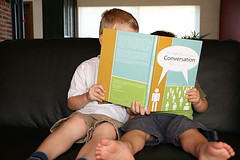What is one of the most important skills human beings develop? It is the ability to communicate. People first learn to communicate at home. When a parent’s priorities are centered on building a loving relationship with his child, he works to set up an environment conducive to everyone feeling safe to express themselves openly and honestly.
Often the adults in a household have the freedom to scream, holler, rant, and rave; but when their child so much as raises her voice, she is punished.
Consider the mixed message sent to the child. An adult has the right to express his or her emotions in any way seen fit; but a child is worth less than an adult, therefore, she must learn to behave herself and be quiet.
The parent rationalizes this with the idea he is teaching his child respect or discipline. The parent is probably living out of his own negative family scripting.
He is teaching his child a very dangerous coping mechanism, how to misplace her emotions. The child is upset or angry, but is told she cannot express her feelings. No matter what the child was upset about initially, her anger will be directed at her parents. This misplaced anger will be manifested in some way, shape, or form. No human being is able to bottle up feelings and maintain any semblance of mental or emotional well-being. These emotions come out at some point.
• A key to ending negative scripting patterns within a family is to create a safe and loving environment.
• When the focus of parenting is on the relationship it is easier to avoid unrealistic expectations.
- A child’s feelings are as real and powerful as an adult’s; they should not be discounted.

Three Tips To Encourage Positive Communication With Children
- Remember children’s feelings are as powerful as adults but kids lack the same coping skills
- Children who are free to express emotions at home are less likely to act out away from home, provide them with a safe place to vent their feelings
- Support children, don’t try to change the way they feel
Emotions aren’t right or wrong. When children have the freedom to talk about their feelings they will, most likely, talk. Adults should remain aware to not judge a child’s emotions, the child will process the feelings if given the chance.
Photo Credit: Kris Hoet via: Flickr
